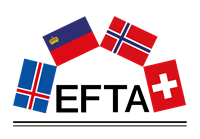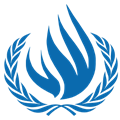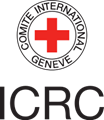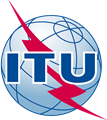The International Organizations in Geneva
The Permanent Mission represents Iceland vis a vis the European Free Trade Association (EFTA), the World Trade Organisation (WTO), the United Nations Office and agencies, the International Committee of the Red Cross (ICRC) as well as other international organisations located in Geneva.
European Free Trade Association (EFTA)
The EFTA Convention was signed in Stockholm 20 November 1959 and came into effect 3 May 1960. EFTA, which is a free trade association but not a customs union, originally consisted of seven Western European states as well as Finland which became an associated member in 1961. Iceland became a member of EFTA 1 March 1970. Currently Iceland, Liechtenstein, Norway and Switzerland are members of EFTA.
The EFTA Convention regulates trade relations between each of the three EEA/EFTA states (Iceland, Liecthenstein and Norway) and Switzerland. EFTA's trading relations with the EU are governed by the Agreement on the European Economic Area (the EEA Agreement) for the EEA EFTA states and in the case of Switzerland by its series of bilateral agreements with the EU. Furthermore the EFTA convention provides the basis for EFTA's collective free trade relations with other countries than the EU.
EFTA's Free Trade Agreements are now 16. EFTA's Free Trade Partners are the following: Turkey 1991, Israel 1992, Romenia 1992, Bulgaria 1993, Marocco 1997, Palestinian Authority 1998, FYR Macedonia 2000, Mexico 2000, Jordania 2001, Croatia 2001, Singapore 2002, Chile 2003, Lebanon 2004, Tunisia 2004, Korea 2005 and an Agreement with the South African Customs Union - SACU (Botswana, Lesotho, Namibia, South-Africa and Swaziland) 2006.
In addition to those agreements the EFTA states had concluded Free Trade Agreements with eight states that have now joined the European Union. The EEA Agreement and the bilateral agreements between Switzerland and the EU have replaced them. These countries are: Estonia, Latvia, Lithuania, Poland, Slovakia, Slovenia, The Czhech Republic and Hungary.
The EFTA states are presently negotiating free trade with Egypt, Canada (negotiations have been on hold since 2000), Thailand and the Gulf Cooperation Council -GCC (Saudi-Arabia, The United Arab Emirates, Bahrein, Qatar, Kuwait and Oman). EFTA is also aiming to start free trade negotiations with Algiers later this year and exploratory talks are in progress with Indonesia.
Furthermore EFTA has concluded Joint Declarations of Cooperation (which may often lead to free trade negotiations later on) with the following states: Albania 1992, Ukraine 2000, Serbia and Montenegro 2000, MERCOSUR (Argentine, Brazil, Paraguay and Uruguay) 2000, Peru 2006 and Columbia 2006.
The Permanent Mission is responsible for Iceland's day to day participation in EFTA and represents Iceland in EFTA's free trade negotiations with third countries under the direction of the Ministry for Foreign Affairs and with the assistance of relevant Icelandic Ministries.
World Trade Organization (WTO)
WTO was established as a result of the Uruguay-round of trade negotiations, which was the eighth and most ambitious round of trade negotiations under the auspices of GATT (General Agreement on Tariffs and Trade), which had been founded in 1947. Iceland became a member of GATT on 21 April 1968 and later on therefore a founding member of the WTO, when it replaced GATT on 1 January 1995.
WTO is the legal and organizational frame around the international trade system. Its principal goal is to increase liberalization and enhance legal framework in global trade and through these means gain increased economic growth and development.
WTO is not solely working on the updated GATT of 1994 on trade in goods. In total there are 29 agreements under the organization, on agriculture, trade in services, intellectual property and dispute settlement i.a. WTO deals with the execution of these agreements, is the forum of multinational trade negotiations, settles trade disputes that may arise amongst member states and reviews member states' trade policies regularly. Iceland's Trade Policy Review was last done in June 2006.
The Doha Development Round
The WTO Ministerial Conference in Doha, Qatar, in November 2001, agreed to start a new round of trade negotiations in an effort to decrease trade barriers still and extend their work to further fields of trade. This round of negotiations has exceeded its original timeframe, but by a concensus of the WTO Ministerial Conference in Hong Kong in December 2005, it was decided to put every effort in finishing these negotiations in the year 2006.
The trade negotiations are supervised by the Trade Negotiating Commitee (TNC) but for specialized negotiations there are nine negotiating committees in separate fields of trade. The negotiating committees meet frequently, for several days each time, every third to sixth week and the Permanent Mission guards Icelandic interests at these sessions.
Representatives from the Ministry of Agriculture participate actively in the Negotiating Committee on Agriculture and representatives from the Ministry of Fisheries participate in the Negotiating Committee on Rules, where members are trying to, i.a., stem government subsidies in the fisheries sector. The work of the Negotiating Committee on Non-Agricultural Market Access (NAMA) is followed closely and the Permanent Representative of Iceland chaired the Committee for a 2 year period, from 2004 to 2006. The Negotiating Committee on Trade in Services works towards more liberalisation of services globally and is closely followed by capital and the Mission, as services are a major contributor to Iceland's GDP.
The United Nations Office at Geneva (UNOG)
The core of the United Nations work in the field of international co-operation on Human Rights and Humanitarian issues is directed from the UN offices and Agencies in Geneva, although the headquarters of the UN are situated in New York. The Genevea based entities include the Office of the High Commissioner of Human Rights, the United Nations Human Rights Council, United Nations Refugee Agencey, and many other councils, committees and agencies. The Permanent Mission attends meetings and represents Iceland in the assignments related to these entities. Here below are some links to relevant websites and a short summary on a few of the main offices and agencies of the UN in Geneva.
United Nations Conference on Disarmament (CD)
Iceland has been an observer to the Conference from the year 1996.
Office of the High Commissioner for Human Rights (OHCHR)
Human Rights Council (HRC)
The work on human rights issues is both based in New York and Geneva, and the Office of the High Commissioner for Human Rights was established in Geneva in 1993.
The Human Rights Council was established in 2006 and held its first session in June 2006. The Council meets three times a year, for a minimum of 10 weeks total each year.
Iceland participates closely in the work of the Council and is a party to almost all instruments and agreements on human rights issues within the UN.
United Nations Conference on Trade and Development (UNCTAD)
Iceland has been a member of UNCTAD since its establishement, but has sat on the Trade and Development Board since 1996.
Economic Commission for Europe (UNECE)
The ECE is one of five regional Commissions established within the UN, to promote regional co-operation in various areas.
Office of the High Commissioner for Refugees (UNHCR)
Iceland has been a party to the Convention Relating to the Status of Refugees since 1956. As the UN Refugee Agency is financed by free donations, Iceland has contributed to that work.
International Committee of the Red Cross (ICRC)
The International Committee of the Red Cross is an independent and neutral organization, ensuring humanitarian protection and assistance for victims of war and armed violence. The ICRC has a permanent mandate under international law to take impartial action for prisoners, the wounded and sick, and civilians affected by conflict.
Its headquarters are based in Geneva, Switzerland and it is at the origin of both the International Red Cross / Red Crescent Movement and of international humanitarian law, notably the Geneva Conventions.
The Permanent Mission follows its work closely and co-operates with the Icelandic Red Cross society.
International Labour Organization (ILO)
ILO was founded in 1919 and is the only surviving major creation of the Treaty of Versailles which brought the League of Nations into being and it became the first specialized agency of the UN in 1946.
The ILO formulates international labour standards in the form of Conventions and Recommendations setting minimum standards of basic labour rights: freedom of association, the right to organize, collective bargaining, abolition of forced labour, equality of opportunity and treatment, and other standards regulating conditions across the entire spectrum of work related issues.
ILO provides technical assistance primarily in the fields of vocational training and vocational rehabilitation; employment policy; labour administration; labour law and industrial relations; working conditions; management development; cooperatives; social security; labour statistics and occupational safety and health.
ILO promotes the development of independent employers' and workers' organizations and provides training and advisory services to those organizations. Within the UN system, the ILO has a unique tripartite structure with workers and employers participating as equal partners with governments in the work of its governing organs
The Ministry of Social Affairs deals with ILO-related affairs in Iceland and participates in ILO's work.
International Telecommunication Union (ITU)
In 1865 the first International Telegraph Convention was signed in Paris and the International Telegraph Union (ITU) was established. New name came into effect on 1934 and since than ITU stands for International Telecommunication Union. ITU became a UN specialized agency under an agreement in 1947 and Iceland became a member of the ITU that same year. The headquarters of ITU have been in Geneva since 1948.
ITU's working environment has changed dramatically in the last years. Connecting computer technology and informational media to telecommunication and increased privatization of telecommunication are among the changes that the organization has been adapting to. The importance of international cooperation when it comes to allocating radio frequency, use of satellites and regularization of equipment has never been as high. The strategic plan for 2004 - 2007 is aiming to bidge the international digital divide by facilitating development of interconnected and interoperable networks and services. ITU also aids developing countries in the field of telecommunication.
ITU's main conference takes place every fourth year. ITU also organizes summits, seminars and exhibitions of various kinds. Biggest of these events is the World Telecom, that also takes place every fourth year, and is a major event by any standard, with a participation of tens of thousands, both from the private sector and from the official side.
World Health Organization (WHO)
The World Health Organization is the United Nations specialized agency for health. It was established on 7 April 1948. WHO's objective, as set out in its Constitution, is the attainment by all peoples of the highest possible level of health. Health is defined in WHO's Constitution as a state of complete physical, mental and social well-being and not merely the absence of disease or infirmity.
WHO is governed by 192 Member States through the World Health Assembly. The Health Assembly is composed of representatives from WHO's Member States. The main tasks of the World Health Assembly are to approve the WHO programme and the budget for the following biennium and to decide major policy questions. The Icelandic Ministry of Health takes an active part in the work of the Organisation. From 2003 to 2006 the Permanent Secretary of State for Health Mr. Davíð Á. Gunnarsson represented Iceland on the WHO Executive Board.
World Intellectual Property Organization (WIPO)
WIPO is based on the Paris Convention of 1883 on the Protection of Intellectual Property in Industry and the Bern Convention of 1886 on the Protection of Literature and Art. The present convention only came into effect in 1970 and WIPO became a UN specialized agency 1974.
WIPO's role is to promote and protect intellectual property and international cooperation in that field. WIPO administers various international treaties and registers patents on intellectual property, dealing with different aspects of intellectual property, ranging from inventions and designs to literature and art. Patent registry fees are the base on which the organization is run, and member states only attribute partially to the budget. Assistance, aid and consulting to the developing countries is a major part of WIPO's work and is increasing.
Iceland is a member to most of the WIPO treaties and has ratified many of them in the recent years, partially due to obligations from the European Economic Area (EEA). The Icelandic Patent Office and the Ministry of Education, Culture and Science deal with WIPO-related affairs in Iceland and attend meetings there.
World Meteorological Organization (WMO)
WMO was founded in 1950, replacing international associations on meteorology that had been working from 1873. WMO became a UN specialized agency in 1951.
WMO's main role is to facilitate international cooperation on meteorological research and the exchange of information between meteorological offices.
WMO has diverse projects, at present, i.a. monitoring the Earth's atmosphere, its interaction with the oceans, the climate it produces and the resulting distribution of water resources.
WMO's main conference takes place every fourth year. The Icelandic Meteorological Office attends meetings and participates in the work of WMO.


.png)









